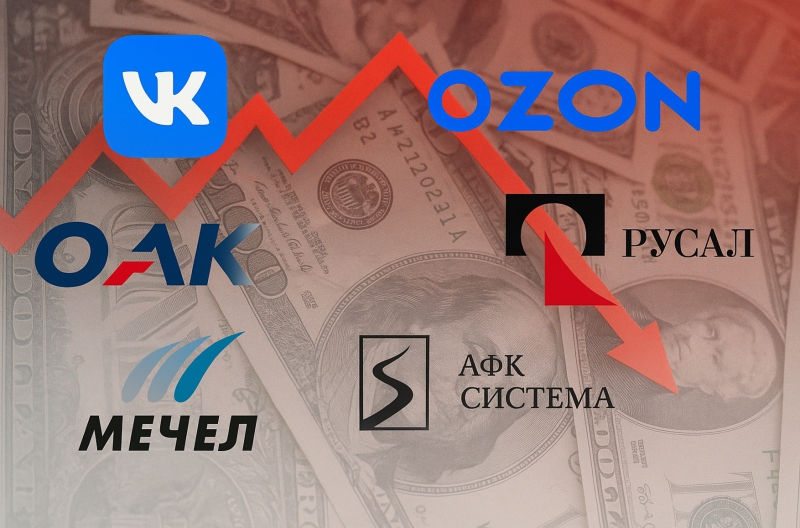In late May, Russia’s Central Bank published a report indicating that 13 of the country’s 78 largest companies were in financial trouble — a significant increase from six firms cited the previous year. Independent publication The Bell has identified the list, which includes social network VK, e-commerce platform Ozon, state aircraft holding United Aircraft Corporation (UAC), aluminum giant Rusal, coal and steel producer Mechel, and the diversified investment group Sistema.
Combining the Central Bank’s methodology with company reports for 2024, The Bell calculated a full list of 13 troubled borrowers with combined net debt of nearly 3.5 trillion rubles ($41.7 billion), around 1.7% of Russia’s 2024 GDP.
Some major state companies were excluded because — with government approval — they stopped publishing full accounts after the 2022 invasion of Ukraine. Oil giant Rosneft, for example, took advantage of this exemption and was left out of the analysis.
VK, the Kremlin’s flagship internet project, has tripled its debt in three years and closed 2024 with a record loss of nearly 100 billion rubles ($1.2 billion). Shareholders bailed it out with a 115 billion ruble ($1.4 billion) share issue in spring 2025, but the company remains in the red. VK is tasked with running services from social network VKontakte to the video platform and national messenger Max, but it has failed to lure users away from YouTube and Telegram.
Ozon, meanwhile, came close to matching Russia’s largest retailers in turnover in 2024. However, with revenue growth came mounting losses — 59 billion rubles ($702.4 million) — and debt topping 240 billion ($2.9 billion). Even its first operating profit in the second quarter of 2025 has not eased concerns over its heavy debt load.
UAC has become the state sector’s biggest “black hole.” Its debt exceeds 2.3 trillion rubles($27.4 billion), while civil projects such as the Sukhoi Superjet and MC-21 have failed to reverse the company’s chronic losses. Military orders have not closed the gap, as debt servicing costs outpace revenue.
Rusal lost access to raw material supplies from Ukraine and Australia and was forced to pivot to China, which demands discounts. With more than $6 billion in debt, the company nevertheless remains on the brink of profitability, even if its relative health depends on high global aluminum prices.
Mechel, meanwhile, has fallen back into a debt trap, reporting a 36 billion ruble ($428.6 million) loss in 2024 and 40 billion ($476.2 billion) in the first half of 2025. Its net debt is seven times its market capitalization, and without fresh agreements with state banks the group may not survive even suspended repayments.
Sistema, which controls MTS, Ozon, Medsi, and dozens of other assets, has also posted losses for two straight years. Its net debt has reached 315 billion rubles ($3.7 billion), worsened by further investment in the loss-making Segezha Group. Without lower interest rates, the company’s debt burden will grow.
Other distressed borrowers among Russia’s largest firms include machine-building group OMZ (Uralmash-Izhora), freight carrier Globaltruck, rocket and space corporation Energia, electronics retailer M.Video-Eldorado, power producer TGK-2, pipe manufacturer TMK, and car-sharing company Delimobil.

